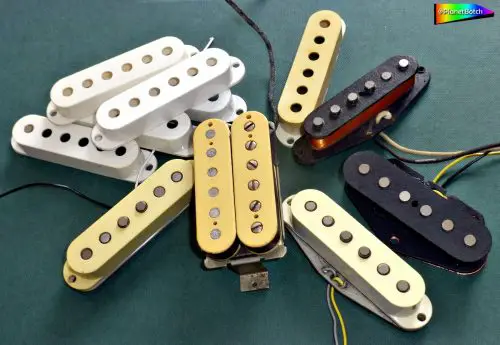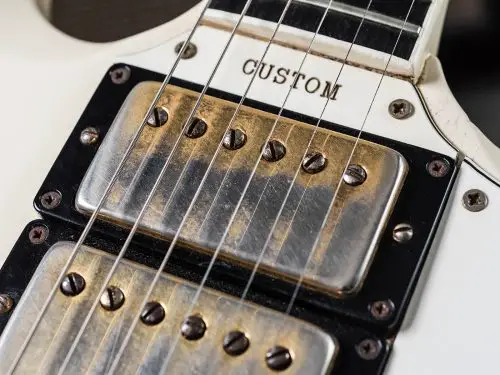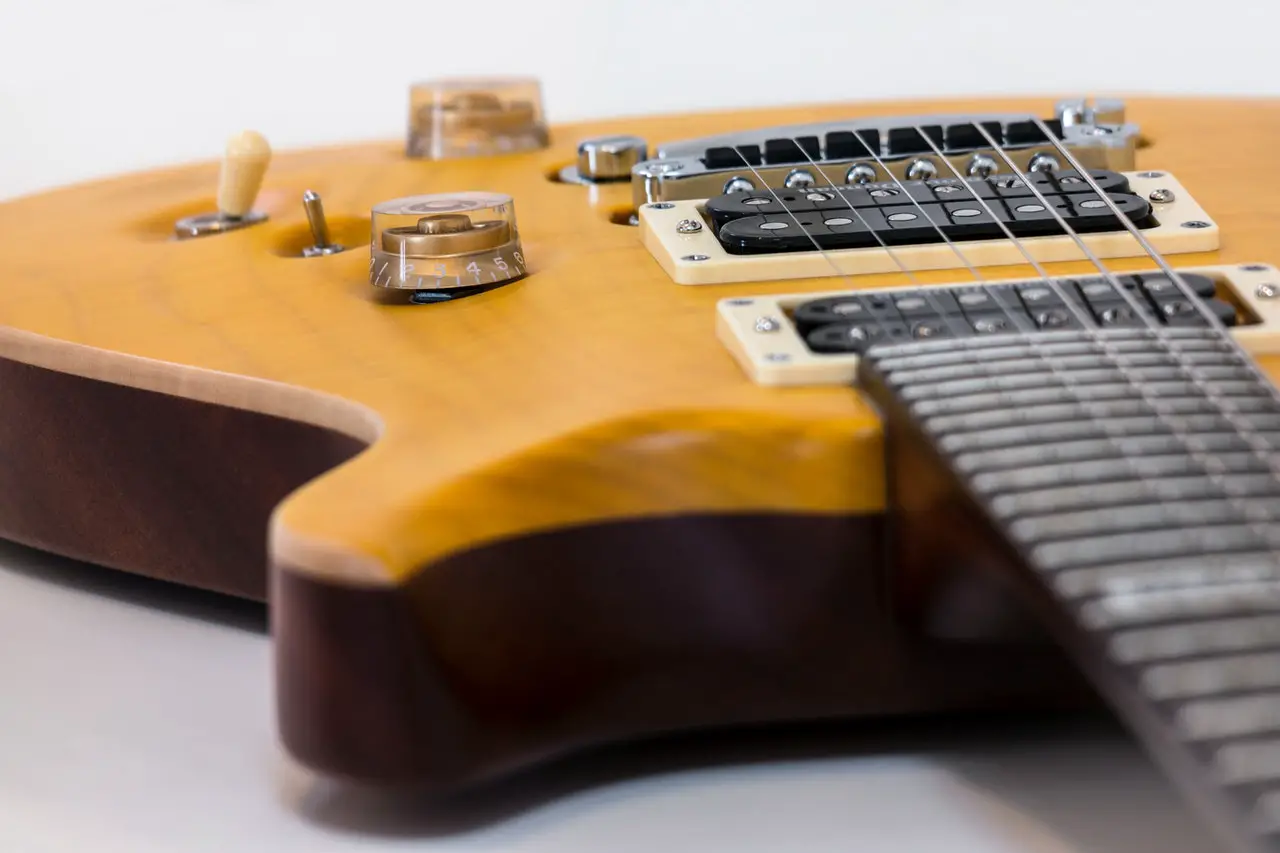Older pickups can sound better to some guitarists depending on their playing styles and genre. Those that don’t need a super high pitch and accuracy tend to like the sound from older pickups.
Older pickups can degenerate and produce lower output. This means older pickups provide lesser sound signals for the amplifier – resulting in a lower pitched and softer sound.
If you are a lead guitarist who likes to play loud, shred a lot and require a clean distortion sound, then older pickups are not for you.
Most times, when your guitar sound quality deteriorates easily from change in weather, using the same amplifier, you can easily trace it to a degraded pickup.
In this article I will be discussing pickup wear, the sound impact and how long pickups usually last. Here are few topics you should get to know about:
- Do guitar pickups get better with age?
- Do aged guitar pickups wear off easily?
- How long can a guitar pickup last?
- Do rusty pickups affect sound?
- How do I age a new guitar pickup?
Do guitar pickups get better with age?
Most guitar pickups will produce lower sound and less pitched when aged. It will provide lesser output to the amps – but some guitarists prefer this aged sound.
If you would rather your guitar sounded a bit better and less pitchy, then consider using an aged pickup. Every glide and note pitch is tone-protected with an aged pickup.
If you really care about the sound, you should focus your effort on amps. Amp is the component which can bring the most impact.
Pickups are just a small piece of magnet that “picks up” string vibrations as you play. Most of the sound effects come from the amp.
With that said, aged pickups do provide a different sound that many guitarists prefer. It’s all a matter of preference. And for me personally, I would focus more on the amps than pickups.

Older guitar pickups produce lower sound output and will produce lower volume.
Do guitar pickups wear off easily?
Old pickups don’t easily wear off. Since they have no stress-impart joints and are fix-static on the guitar body, they are prone to less hassle overtime. The only challenge is if they are short-circuited or installed inappropriately.
Their magnetic coil must have stood the test of time for them to keep their pickup effect. They only slow down when they are exposed to moisture or overheated.
Coils don’t break and the magnets don’t lose their magnetism. The only fault could be from improper installation, short-circuit or deep corrosion (from rust) – which takes a really long time.
How long can a guitar pickup last?
Pickups should be protected from corrosion-prone conditions. However, from a common poll from guitarists, manufacturers vouch for pickups to last for as long as 6 months to a year, even from repeated use.
Tonal quality may deteriorate after close to a decade. Passive humbuckers and P90’s sound at their best within the first 9 months of use.
From new to old and still in continuous use, guitar pickups last around 5 years before deterioration begins to crawl in.
The Alnico (Aluminum, nickel copper alloy) used in making the magnets provide a permanent magnetism that makes it hard for you to trace the decay of a guitar pickup.
The coil shape is also found to contribute to the lifespan of a pickup. Strat pickups have a tall and narrow shape. They are built to last – even for rough use.
P90 pickup coils are short in height but are very wide. Both types impart their unique tones. But more to that is that the P90 coils tend to last longer – at least, a month longer than its contemporary coils.
P90s assume an induction shape that allows it to disperse vibration quite easily from the poles to the magnet ends and reverberate it into a transmittable frequency by the wound coil.

Old pickups will start deteriorating after 1 year. However, you can still use them for much longer – if you are fine with the sound.
Do rusty pickups affect sound?
Rusty pickups will not impact sound. However, it’s still recommended to remove those rust to prevent deep corrosion – that could eventually destroy your pickups.
Rust can hinder the amount of sound vibrations that are picked up by the pickups. Initially, it can still work fine and your amps still receive enough signals to amplify.
However, leaving rust to sit for a long time can eat away your pickups – where it eventually fails.
How do I age a new guitar pickup?
Part of the things that picker gurus do to ‘relic’ a pickup is to gently scrub (scour) the surface of the poles and the magnet to give it more like a fairly distressed face. This has to be done with a painstaking know-how else you’d be losing your pickup altogether.
The routine procedure for pickup doctors is to sustain and pitch-bend for as many times as they would deem fit to understand the custom effect of original pickup and where the flaw(s) lie(s).
This is done to lessen active pickups (poles) which age the slowest. After the sound output must have reduced in treble frequency over (~) 2 years, the ageing becomes more rapid.
Single coil pickups age slower than humbucker pickups and they might need the hands of a pickup ageing master to improve their tonal sound production.
A new guitar pickup can jumpstart into an old one with all the characteristic features we’ve talked about so far. How?
With a bit of pickup scouring using a tiny-mouth semi-soft brush, and dust-off spraying with compressed air regularly,
Some Strats jazz & funk genre guitarists complained that replacing their new guitar pickups with old ones was like patching a torn new cloth with a rag (putting a new wine in an old wineskin thingy).
But the good news is that you don’t have to completely change your pickup – especially if you’ve got a fair concern about removing any part of your guitar when newly bought.
A new pickup is strong in magnetism. An old one seems to be weaker but less fluctuating in flux. That makes a new pickup to sound punchy.
Ageing a pickup overmuch may denunciate the treble in the tone and make the sound flat and crisp without clarity than they were once used to.
Conclusion
If you need a guitar sound experience that is not wavy in path, but dependable for different sound engineering conditions, an old guitar pickup is worth an installation.
As a guitar solo artist, you don’t want tone ramblings every time you decide to pitch-bend a note. New pickups have frequency distortions because the coils are still newly wound and the poles still have a close-to-static domain within their axial plug perimeter.
Go for an old pickup installation if all you desire is a stable note sound for high-end pitches that you won’t be scared to run anytime you’re on an amp.
By virtue of cost-effectiveness, changing a new pickup to a fairly used old one connives with your urge to get the sound accustomed as early as you get a brand new guitar. You can keep the new pickup and let it age up a bit before reinstalling it.





